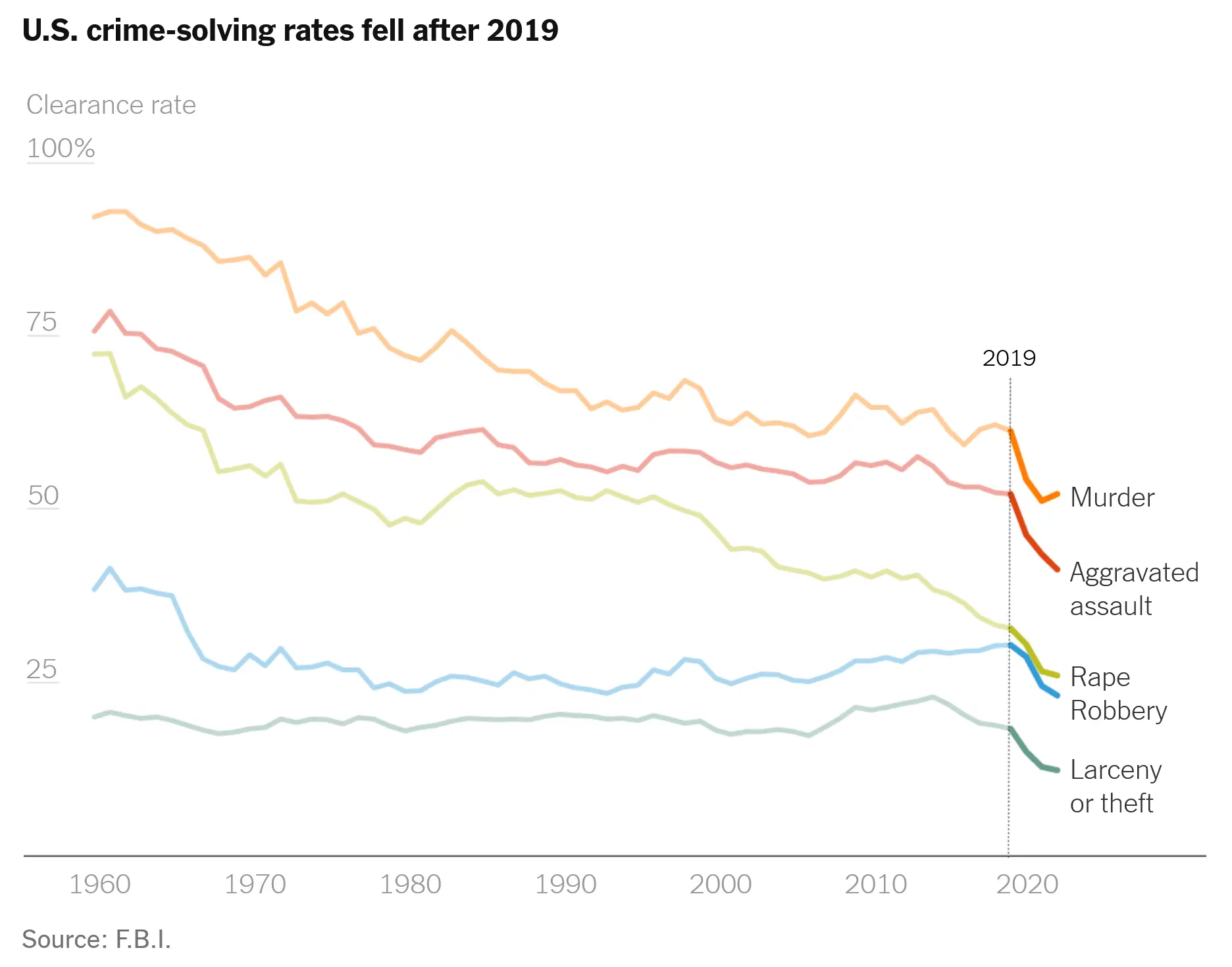While headlines tend to focus on falling clearance rates in large liberal cities, the decline occurred nationwide in both red and blue cities, counties and states. The violent crime clearance rate, for example, fell considerably between 2019 to 2022 in big cities, which tend to be led by Democrats, as well as in small cities and suburban and rural counties, which tend to be led by Republicans.

deleted by creator
The point of police isn’t to stop crimes, they’re an occupying force to control their own citizens. Militarization isn’t a bug, it’s a feature.
“Early” warning that we’ve got some issues with policing, eh.
“Early”
deleted by creator
Well… that is kind of their job. They can only find the pieces and it is up to the judicial system to establish guilt.
Unless you want to live in the world of Judge Dredd.

Your question makes very little sense. How do you think prosecutors work, exactly?
The order of operations for going to prison is:
-
Cop wants to arrest you. If the cop has no genuine excuse to do so, this arrest won’t go anywhere (they can still lock you up for up to 24 hours at will). If you’ve just committed a crime in front of the cop, well, that’s easy, the cop just puts you away; skip to step 3. If this is an investigation, the cop goes to step 2.
-
Cop gets permission from a judge to arrest you. This is called an arrest warrant.
-
Cop arrests you and puts you in jail. At this point you should lawyer up, but as that is not compulsory, it is not a distinct step in this list.
-
Cop gives evidence to prosecutor. Because there is a time delay between 3 and 4, the cop may do additional investigating before this step.
-
Prosecutor decides to prosecute (they may choose to dismiss instead).
-
You go to court. Judge asks you how you plead. You plead not guilty. The media pretends this is notable, even though no-one pleads guilty ar this step (it is called arraignment).
-
The evidence against you is shown to you. The judge again asks you how you plead. This time you have a genuine choice in your answer.
-
Optional: if you pled not guilty, go to trial. Jury convicts you.
-
Judge sentences you to prison.
That’s the basic pipeline.
Note that cops don’t have to do their jobs at all, which is most likely why, as the article discusses, they don’t. Why get paid to work when you can get paid to not work?
-
It’s not necessarily the case though that fewer crimes are being actually “solved,” in the most precise sense of the term.
It could be that the current heightened interest in police oversight and focus on investigation of (and huge lawsuit payouts as a consequence of) wrongdoing by the police has made it less likely that people will be railroaded/framed for crimes they didn’t actually commit, so the rate at which crimes are marked as solved has declined, even as the rate at which they actually are solved hasn’t.
While this certainly sounds plausible, even rational and perfectly logical, it’s also the exact sort of argument that could easily be spurious. Now, i’m not making that accusation (nor do mean to imply it), but do you happen to have any data backing up this assertion?
Eh?
I said that it’s “not necessarily the case that” one thing and “it could be that” something else.
Logic and plausibilty are all that’s necessary.
when asking for evidence, i didn’t expect equivocation and, “it’s just a guess, bro,” hand-waving in response-- see, this is why i was skeptical and asked.
Logic and plausibilty [sic] are all that’s necessary.
no. evidence is necessary. otherwise, it’s just speculation, and that’s just not good enough.
What the fuck are you on about?
It’s not necessarily the case though that fewer crimes are being actually “solved,” in the most precise sense of the term.
It could be that the current heightened interest in police oversight and focus on investigation of (and huge lawsuit payouts as a consequence of) wrongdoing by the police has made it less likely that people will be railroaded/framed for crimes they didn’t actually commit, so the rate at which crimes are marked as solved has declined, even as the rate at which they actually are solved hasn’t.
That’s everything I said, right there. What part of it are you not understanding?
evidence is necessary. otherwise, it’s just speculation
Of course it’s fucking speculation! What the fuck else did you think it was?!
i didn’t expect equivocation
It would be equivocation if there was a disjunct between the intended meaning of what I said at one point and the intended meaning of the same thing at some other point.
But I’ve been entirely consistent in what I’ve said. The disjunct is between what YOU thought I meant and what I actually said, and that’s your fucking problem - not mine.
Yeah, I’m not reading that hissy fit. When you make assertions, back it up with evidence. If it’s just a guess, say so.
They did say so, from the start.
Then it should be easy for you to show me the quote where they said it was just guess.
The comments here should be good. All well thought out and reasonable. munching popcorn





